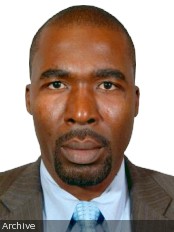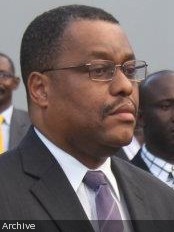Haitian lawmaker released from jail amid protests
(AP) PORT-AU-PRINCE, Haiti (AP) — A Haitian lawmaker who was jailed on charges that he escaped prison on the day of last year's massive earthquake was let go Friday.
Following his release, Dep. Arnel Belizaire went to parliament as several dozen supporters gathered outside the building to greet him with hugs and cheers.
The overnight detention of Belizaire was a rare instance in which police have locked up a government official. Investigators must formally request that immunity be lifted before they can question an official.
Police jailed Belizaire Friday shortly after he had returned from a trip to France. Police say Belizaire was an escaped prisoner who fled the national penitentiary in the chaotic aftermath of the Jan. 12, 2010 earthquake. He had been locked up since 2004 on an illegal weapons charge.
Despite his criminal record, Belizaire somehow proved eligible to run for office in a drawn-out election that began last year and ended early this year; candidates are required to show they have a clean record. Belizaire was elected to parliament in a March 20 runoff.
Since he took office, Belizaire has been an open critic of Haitian President Michel Martelly, who was sworn in in May, and the two have been heard lashing out at each other at the National Palace.
Belizaire is a member of Veye Yo, a political party headquartered in Miami, Florida, that has strong ties to former President Jean-Bertrand Aristide.
The detention of Belizaire threatens to aggravate already uneasy relations between Martelly and parliament, whose members rejected the leader's first two picks for prime minister before approving the third.
The head of the United Nations mission in Haiti and the French Embassy on Friday responded to Belizaire's detention by issuing statements. France urged the government and legislature to bear in mind "procedures" involving the separation of powers and parliamentary immunity.
=======================================================================
THU OCT. 27 by Samuel Maxime
Deputy Arnel Bélizaire Arrest
![Dep. Arnel Belizaire [file]](http://defend.ht/images/resized/images/stories/906v_200_200.jpg)
PORT-AU-PRINCE,
Haiti (defend.ht) - Deputy Arnel Bélizaire (Delmas & Tabarre/Veye-Yo) was
arrested by police and taken to the National Penitentiary on Thursday upon his
return from Paris, France and while still under parliamentary immunity.
With a warrant of arrest from the Central Directorate of the Judicial Police (DCPJ),
at the direction of Attorney General Félix Léger, the police awaited the return
of Deputy Bélizaire with the support of soldiers from the United Nations
Stabilization Mission in Haiti (MINUSTAH).
The Air Cairibes plane landed at 16:30PM EST at Toussaint Louverture
International Airport. Police delivered the warrant to the member of parliament
before taking him away.
A convoy of parliamentarians were present at the airport for the event which
drew on-lookers. The parliamentarians object to the arrest of Deputy Belizaire
as it is unconstitutional to arrest an elected member of government. Police
blocked access to the airport, even from the President of the Chamber of
Deputies, Sorel Jacinthe (Moron & Chamberllan/Inite), who was kept by police.
Some hurled hostile words against President Martelly for the arrest and others
announced plans to gather and respond to the Executive even so far as revoking
the entire cabinet according to one MP.
Legislatures are out of session until 2012 barring urgent circumstances.
Committees are still operational and have made plans to discuss the matter but
it remains to be seen if a convocation of the National Assembly will occur.
The President and Vice-president of the legislative branch have denounced the
arrest of the elected representative of Delmas & Tabarre.
The Press Secretary for the National Palace, Lucien Jura, told DH there is no
comment at this time.
After a verbal altercation with the President of the Republic, Deputy Arnel
Bélizaire's, who holds a record of arrests for fraud, possession of illegal
firearms and auto theft between 1995 and 2005 has been pursued by justice as an
escapee from the National Penitentiary. Belizaire benefited from support within
the previous, President Réne Gracia Préval administration in obtaining clearance
to participate in legislative elections.
======================================================
The counterattack of parliament
29/10/2011 10:52:16

Both rooms were in session, until late Friday evening in response to the arrest the day before of the deputy Arnel Bélizaire, in order to determine measures to be taken in response to the arrest of Deputy Bélizaire deemed illegal. The senators believe that the arrest of Bélizaire by police officers by order of the prosecutor "threatens the democratic foundation of the nation while trampling the dignity of the legislature."
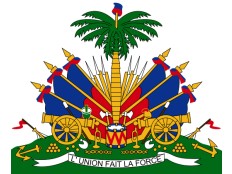
Both chambers, each on their side, have adopted resolutions. The lower house passed a resolution asking for explanations and calling for the resignation of Ministers Josué Pierre-Louis, Minister of Justice and Public Security, of Me Thierry Mayard Paul, Minister of Interior and National Defense, of Michel Brunache Secretary of State for Foreign Affairs [which would be involved in the blocking of access for the deputies to the diplomatic lounge of the International Airport] and of Me. Félix Léger Commissioner of the Government, all considered as directly responsible of the arrest of the Deputy Arnel Bélizaire deemed illegal. 71 parliamentarians have signed the resolutions a few hours after the Deputy Bélizaire, was taken back to the Lower House by the prison administration.
The deputy Abel Descolines explained "It's first a draft resolution, it is not really a resolution to the extent that the Chamber of Deputies is in extraordinary session so we are not able to organize a session, but given the urgency and the complexity of the situation after the arrest of colleague Arnel Bélizaire, [...] there is a special session which grouped the majority of deputies of the 49th Legislature.
At the end of the debates that lasted several hours, it was agreed that we adopt a draft resolution to denounce the illegal arrest of deputy [Bélizaire] to the extent that the procedures of the Constitution were not complied [...] this draft resolution will be finalized within 24 hours [...] it's primarily a formal and official denunciation of Deputies of the 49th Legislature of the arrest, which did not follow the procedures of the Constitution, of a Deputy in the exercise of its functions, to the extent that the procedure which should, eventually lead to the waived of the parliamentary immunity was not made [...] then, in this draft resolution, it is a question for a set of Minister to give explanations about what happened [...] at the end of this explanation, the entire legislative body or a majority, will decide of the opportunity to to follow up the question that can lead on an interpellation [of the people involved] [...]"
If these ministers and Secretary of State do not leave their posts, they will be interpellated at at the opening of Parliament in January 2012 and will be subject to a vote of censorship or of no confidence, according to the Constitution [they risk the destitution]. Regarding this possibility, the deputy Abel Descolines declared "we're not there yet [...] is a draft resolution. Currently the Assembly has as concern to give a political response to what the 49th consideres as an affront [...] we do not anticipate we will finalize the resolution within 24 hours"
The deputy Guy Gérard Georges precise "... the resolution requests that the Minister of Justice, the Minister of the Interior, the Secretary of State for Foreign Affairs, because it is not the Foreign Minister, because he was not there [...] that they resign [...] and if they do not resign, when we will enter the second Monday of January in regular session, we will take legal steps that the Constitution gives us to make go these Ministers, if they have not resigned voluntarily [...]"
For its part, to the Senate a resolution signed by 16 senators decided to interpellate Josué Pierre-Louis, Minister of Justice and Michel Brunache Secretary of State for Foreign Affairs, on 3 November. Mr. Michel Brunach is interpellated on the fact that parliamentarians was denied of access to the diplomatic lounge of the airport Toussaint Louverture, during the operation that led to the arrest of the deputy.
Josué Pierre-Louis, the Minister of Justice and Public Security, said Friday, before the press not having made an intervention to the Commissioner of the Government and denied any involvement in the arrest of the deputy Bélizaire, saying that it was in no case of an order of the Ministry of justice "there are several authorities who spoke on the issue, what I can say, is that the conduct of state affairs requires cool and calm [...] the law prohibits a Minister of Justice to give individual instructions as part of a file which is treated by the justice . Of course, the Government Commissioner is the representative of the executive within the judiciary, but the representative of the executive, it's within the framework of the implementation of penal policy of the government, but not in the exercise of the the public service [...] I can ask to the Government Commissioner to put the public action in motion, if there is public outcry, if there is the fragrance, but I can not call the Government Commissioner to prohibit it to put the public action in motion. Yesterday I received a letter to 1:00 pm, of the office of the Chamber of Deputies. Immediately I contacted the Government Commissioner to ask him to explain me the law, if the facts are constituted, if the facts are based, if the procedure meets the legal requirements..."
The first reaction of the Parliament confirms the deterioration of relations with the Executive and the opening of hostilities with all legal means provided by the Constitution.
===============================================
The Deputy Bélizaire was transferred to the Lower House this Friday
28/10/2011 19:22:24
The Deputy Arnel Bélizaire, accompanied by the Director of the National Penitentiary and agents of the National Penitentiary Administration (APENA), was transferred Friday to 1:30pm, in the Lower House in accordance to the law, in much confusion. It is not known if the Deputy is free and under what conditions, only that he remains available to the Government Commissioner to be interviewed during this case.
Me Félix Léger Commissioner of the Government is returned to the charge by writing to the office of the Chamber of Deputies to ask it to put Mr. Bélizaire at the disposal of justice. "The Government Commissioner took the opportunity to transfer the Deputy Arnel Bélizaire in accordance with law for appropriate actions and related given that he is being prosecuted for the offence of evasion ; continuing offense and underlying to the offenses of murder and detention, defined and penalized by law", we can read in the letter.
The Deputy Bélizaire, met with the President of the Assembly, before taking part in a session [informal] of the Chamber of Deputies in order to determine the behavior to adopt following the imprisonment of their colleague Arnel Bélizaire. In his first words to the press after spending a night at the National Penitentiary, Arnel Bélizaire thanked its colleagues and the Haitian people for their support in this difficult time.
Currently, the Lower House and the Senate are in Assembly concerning what is now called "the Case Bélizaire". For his part, Mr. Félix Léger asks again the waiver of the parliamentary immunity of deputy.
========================================
The Prime Minister takes note of the arrest of Deputy Bélizaire
28/10/2011 15:36:11
The Prime Minister, Dr. Garry Conille, took note of the circumstances surrounding the arrest of Deputy Arnel Bélizaire, Thursday, October 27, 2011, at the international airport of Port-au-Prince.
Once informed of the detention of Deputy, the Prime Minister visited the National Penitentiary to assess the conditions of his incarceration and ensure the integrity of his person.
Deeply concerned about the imprisonment of a Deputy in function, the Prime Minister responsible for the execution of the laws of the Republic, convened in emergency the Board of Governors of the National Police (CSPN) to collect all relevant information to the treatment of this issue and spoke in the same direction, with the presidents of the Senate and the Chamber of Deputies.
The Prime Minister continues, in this case, to explore all avenues and procedures that can facilitate an exit that meets the constitutional prescribed to this crisis. He advocates the full respect of the constitutional prerogatives and privileges of state officials by inviting, furthermore, all social and political actors to the serenity and dialogue.
The Prime Minister reaffirms its commitment to ensure in all circumstances, the protection of individual and collective freedoms and the respect of the inalienable rights of the citizen in a Rule of Law.









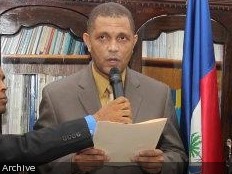
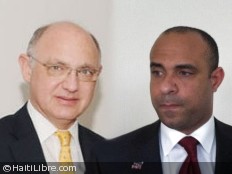
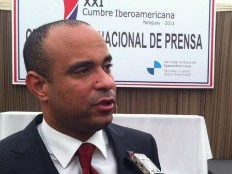
![[file]](http://defend.ht/images/resized/images/stories/912x_200_200.jpg)


![Dep. Arnel Belizaire [file]](http://defend.ht/images/resized/images/stories/906v_200_200.jpg) PORT-AU-PRINCE,
Haiti (defend.ht) - Deputy Arnel Bélizaire (Delmas & Tabarre/Veye-Yo) was
arrested by police and taken to the National Penitentiary on Thursday upon his
return from Paris, France and while still under parliamentary immunity.
PORT-AU-PRINCE,
Haiti (defend.ht) - Deputy Arnel Bélizaire (Delmas & Tabarre/Veye-Yo) was
arrested by police and taken to the National Penitentiary on Thursday upon his
return from Paris, France and while still under parliamentary immunity.
